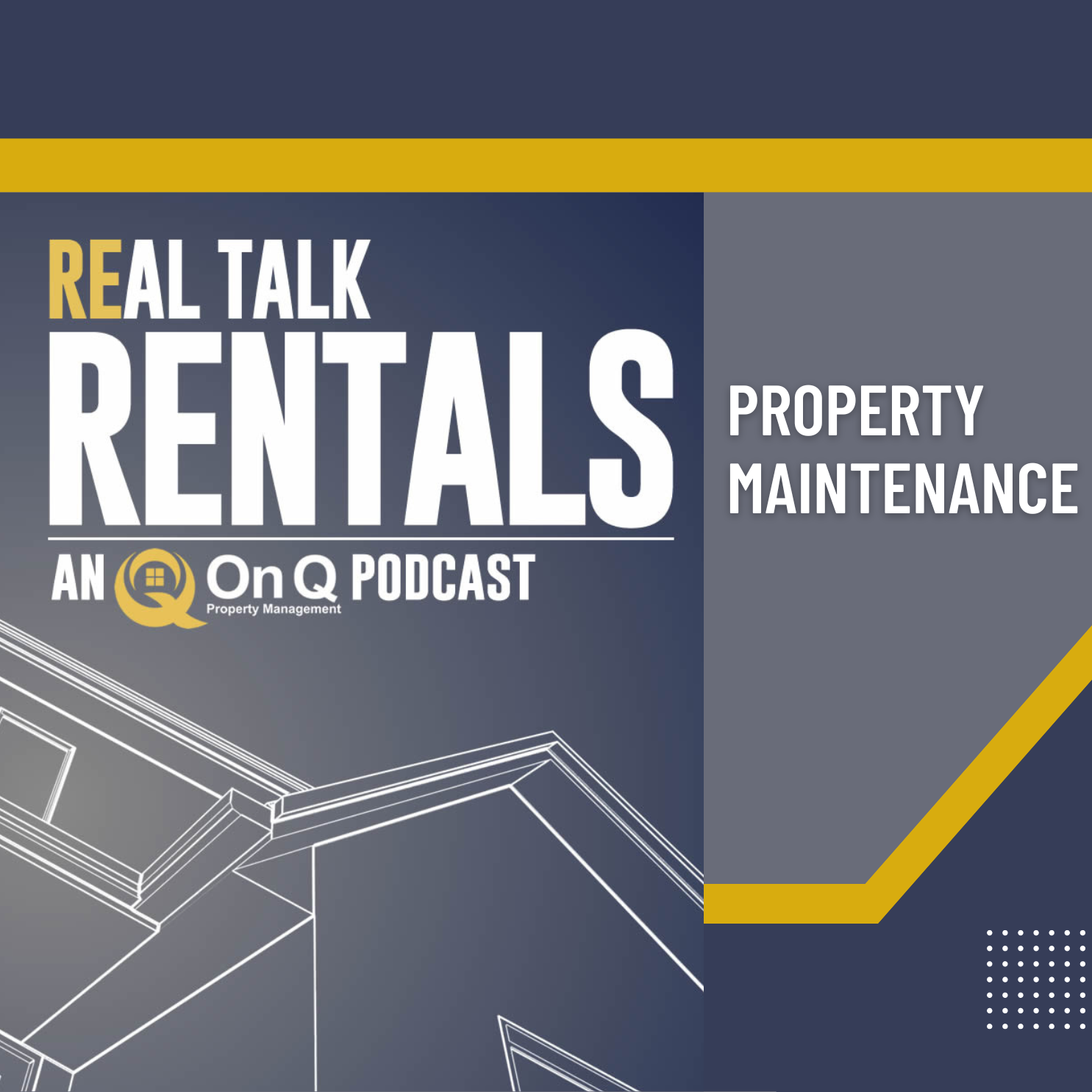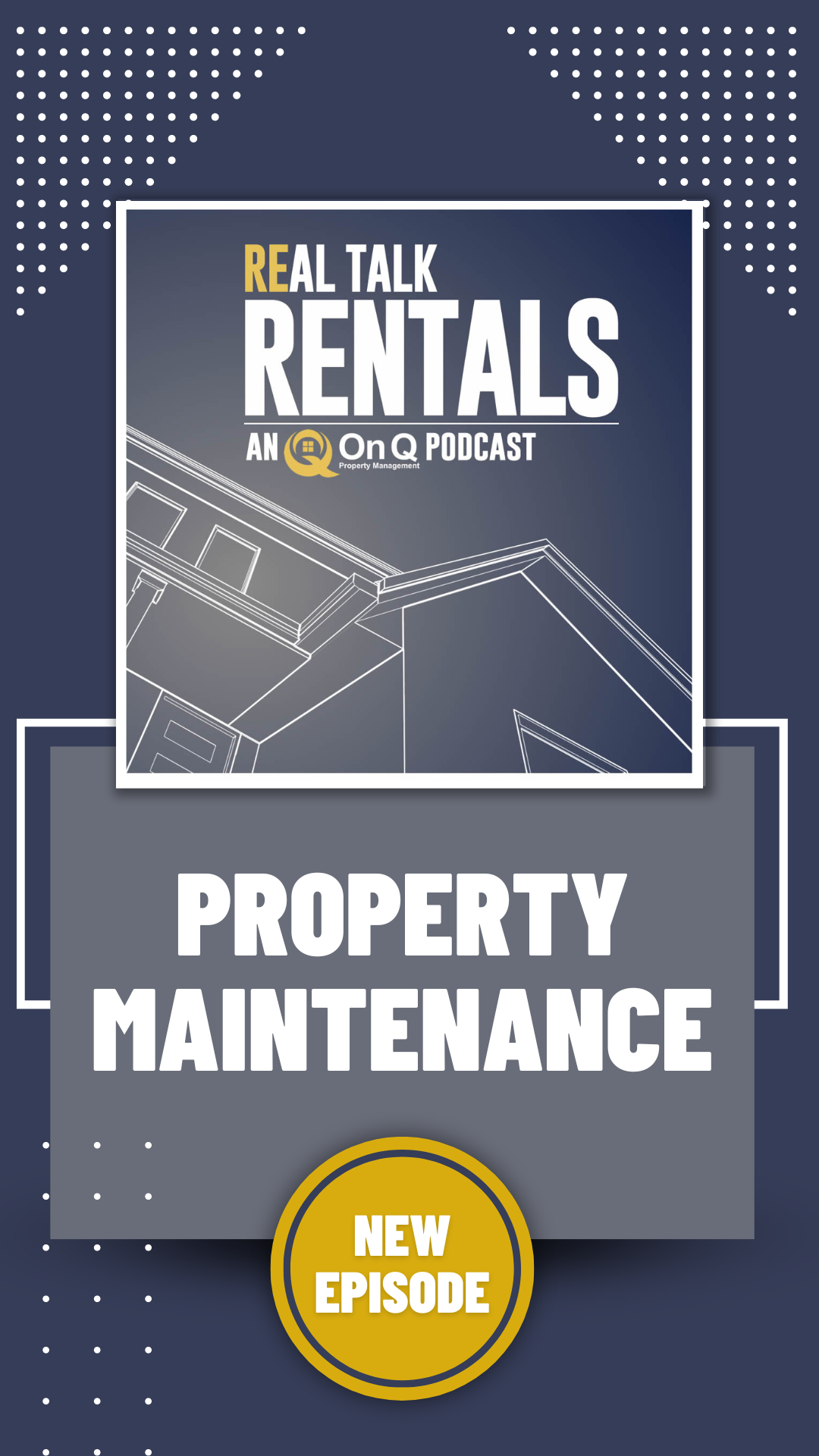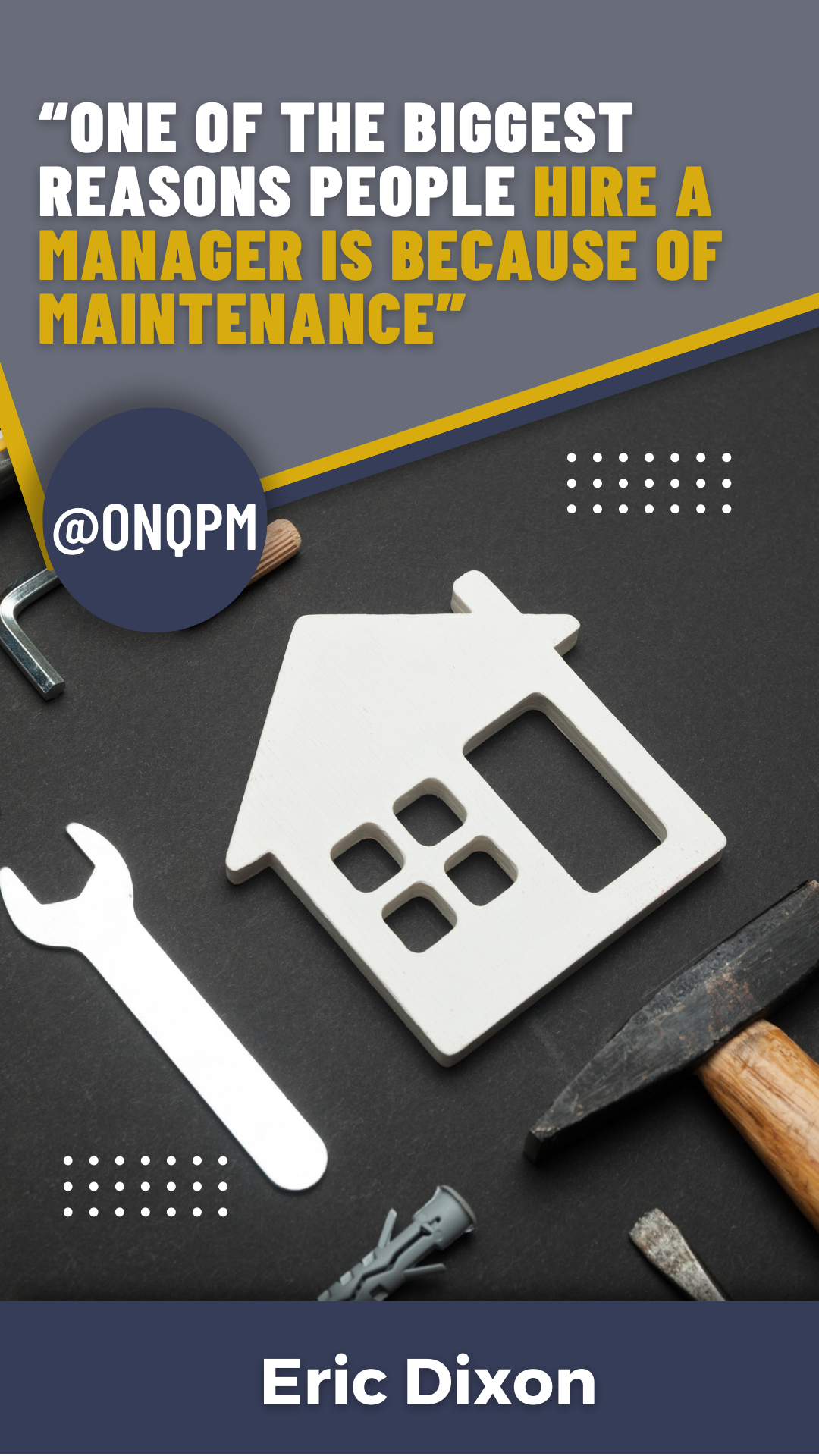REAL TALK RENTALS
Episode 12: Property Maintenance
How do you manage your property’s maintenance? Do you do it yourself or have to spend time looking for the right technician? Property managers can take all that work and worry off your hands. In this episode, Ben and Eric discuss why your rental property maintenance doesn’t have to be a financial burden but a smart investment. From regular upkeep to being prepared for the unexpected, property managers help you stay on the right track and keep your investment properties in pristine condition!
This episode covers:
- Benefits of Property Managers Handling Maintenance Management
- Details on the Maintenance Process
- Preventative Maintenance
- Regular Rental Upkeep







Interested in Learning More About Property Management?
Episode Transcript ExpandProperty Maintenance
Ben Bailey: On this episode of Real Talk Rentals, we’re going to be talking about maintenance. Nobody likes it, but it is a necessity. Welcome to Real Talk Rentals, a podcast brought to you by on Q Property Management. We’re here to give you the behind the scenes look at property management and everything that goes into owning a rental property. I’m Ben, I’m your host. With me, as always is my co host, Mr. Eric Dixon, the go to expert on all things property management out here. And today we’re going to be diving into something that everyone kind of dreads. It’s a it’s a scary word in property management, and that is maintenance. What happens when things break? What happens when repairs are needed? We’re going to walk you through that process from a property management standpoint and then try and give you a little bit on the self management and as well. So, Eric, I’m going to throw it to you with, with a property management company, obviously us here at NQ, what is the maintenance process look like?
Eric Dixon: Well, yeah, it’s kind of a loaded question because maintenance is it’s, it’s probably more than half of the actual day to day job. You know, as far as the property manager is concerned, if there was no maintenance, it would be obviously rent collection and the accounting and that sort of stuff. The maintenance is a huge part of it. Yeah. Funny enough, I was just on a call yesterday. Somebody called in and I was I was the backup guy for the sales people and. You know, we went through the normal spiel of our service and we talked for about 20 minutes and he was excited. And then he’s like, Hey, how does the maintenance work? And I could tell he had big anxiety about it. Sure. Like, he’s like, Hey, I was trying to sell my home. It’s been on the market for 90 days. I’m looking at, Hey, maybe I should rent this place instead. But I’m really concerned, man. I mean, my house is older. The AC’s ten years old. He has a pool, he has landscaping that probably don’t want attendants to take care of. It’s kind of higher, higher touch landscaping. And I could just tell he’s like, go, like, go up on the other side of the. Yeah, the.
Ben Bailey: If that wasn’t in consideration, it’d be like, just do a rental. Oh, no problem.
Eric Dixon: And we talked about I told him, I said the biggest unknown expense in property management, owning rentals and everything is maintenance. I mean it’s just you don’t know. I was telling you yesterday as we were kind of talking about, hey, this is what we’re going to talk about tomorrow, is I replaced a roof this year that I wasn’t anticipating for at least five or ten more years, right? Yeah. So it’s like and we’re talking it’s a tile roof and it’s a bigger house and it’s like, dude, that was not something I was expecting. And you just have to be able to stomach it, know. And so anyway, as far as what the process looks like, it’s more just understanding that as a whole in property management or if you’re a self managing landlord and you’re struggling with maintenance, that’s kind of that’s okay. That’s the name of the game. One of the biggest reasons people hire us or a manager in general is because of maintenance, right? I’m done. I’m sick of doing this myself. It takes so much time and effort and liability and and that sort of thing.
Ben Bailey: Yeah. So really we were talking about there’s two kinds of maintenance than in that, right? There’s, there’s. The unexpected. The roof that you had, you weren’t prepared for. And then there’s the things like you were mentioning before the pool, the landscape stuff that is just maintaining the property that still needs to happen, even though it’s renters are in there.
Eric Dixon: Yeah. Yeah. And so and you’re right. So the breakdown is the routine stuff is, yeah, if you have a pool, you have pool service, you have landscaping that needs more work than an average tenant would do. You could include landscaping. A lot of our owners are and clients are including at least quarterly or biannual pest control. Or if they’re not, it’s tenant responsibility. And then the routine checks, at least here in Arizona, like a routine check on your AC system, your HVAC, you’ve got to do it. It’s going to save you a big repair over the summer. Water heater flushes, roof inspection and roof maintenance. I kick myself because this roof that I had to replace, I could have done roof maintenance on it, you know, spend four or 500 bucks every five years and get the broken tiles and get the motor caps fixed and, you know, get this tiles that are sliding fixed. And I wouldn’t have to have done this huge repair and ultimately replace it, you know? Right. So I kicked myself even talking about it. And then you have the unexpected. So I talked about the roof. But here in Arizona, we talked to our maintenance coordinator yesterday and said, hey, what are the top four maintenance requests that come in? We’re going to do top three. But we knew the number one, obviously. Obviously, it’s AC, right? So here in Arizona, it’s like AC from March, April until October. It’s just it is by and large the the most submitted maintenance request. Sure. So aside from that number one, the number is two, three, four. And I was a little bit surprised in this order leaks. So plumbing related leaks, right. Whether it’s a valve or a faucet or a dishwasher line or some sort of water leak, a water heater not working, you know, and those are it’s common. And then electrical issues was number four. So, you know, light switches, outlet doesn’t work more than a breaker not working. It’s like, hey, something happened or the fan doesn’t work and it ends up being a short or something like that.
Ben Bailey: And it’s funny that we knew right away it was AC And it’s obvious because not only are ACS essential here, you can’t survive, obviously in Arizona, but. It’s the kind of thing that a tenant is going to call on right away because it is an emergency. If it goes out in July. Whereas maybe they’re like, Oh, that’s ceiling fans not working. I got to I should put in a request to have that fixed, you know, And it might not be.
Eric Dixon: Top of mind. Not top of mind. Yeah, exactly.
Ben Bailey: Yeah. And I know there’s like this kind of panic in owners that they think, oh, they’re just going to say everything’s broken and want everything to be replaced. And it’s like usually it’s the stuff that is serious, you know, they’re not, they’re not just for fun filling that out. They’re. They’re doing it because. There’s no AC and it’s 120 outside.
Eric Dixon: Yeah. And really, as you bring that up, there’s a mindset of a tenant versus an owner of a property that maybe lived there. Sure, I’m guilty of it, but there are things that are wrong in my home that I own right now that you just that I’ve neglected and I haven’t fixed them. Right. But if we rented it out, that’d be the first call, right? It’s like, dude, this, this handle, there’s actually there’s a door in our house we took. My wife and I were just talking about it last night, and I was like, Oh, I didn’t know that door stuck and the pin doesn’t engage. And so that bedroom door doesn’t latch. And it’s like, Oh, I didn’t even know that. But if that doesn’t latch, that’s a maintenance call. Yeah. And so there’s some things that you just normally would live live with that tenants, It’s an expectation and the bar is high, you know, you’ve got to maintain that type of stuff.
Ben Bailey: It’s. I remember. So I’m a renter and I’ve been living in the same place for five, six years now. And the first four years, nothing. We never had to call for anything.
Eric Dixon: The dream. You’re the dream tenant, man, right?
Ben Bailey: Yeah. Not a single phone call, right? For four years. Because it was like everything was good. It was taken care of. There was nothing broke. Nothing. Nothing that we couldn’t fix ourselves. Just like something needed to be tightened or tightened or whatever. Yeah. And then this last year, the AC went out. Unrepairable. They had to replace the whole thing. They had to fix the roof, the house had to be painted. We got a letter from the HOA saying, Oh, that.
Eric Dixon: Forced them to paint it.
Ben Bailey: They forced them to paint. And I was like, Man, you know, thinking about your roof story, it’s like my landlord had to do all of that this year.
Eric Dixon: This year? Yeah.
Ben Bailey: And she probably was not expecting that, you know? But it’s like, I can’t control that, you know, I’m not trying to be the bearer of bad news, but who is mad at you? You got to paint.
Eric Dixon: Yeah. And do you know what? It’s it’s one more point to drive home. Is that the tenant? It doesn’t make you a bad tenant. Right? Right. And I know the perception is, man, this tenant’s crazy. I’ve had to replace the AC. I’ve had to paint the house, I had to fix a roof leak. And it’s like, no, all of those things would have happened. Good or bad. Tenant, you know? Yeah. Whether you pay on time, you don’t pay on time, whether you damage the house or not, you know, those things would have had to be done. And unfortunately for your landlord, it happened all in in 2022, It happened in one year period. And so, you know, that’s the unknown expense. For years they were riding the gravy train with you. Yeah. They’re great issues. Yeah.
Ben Bailey: So I know for me, my my process, right? Like the AC went out, I just my landlord self manages. I just picked up the phone and called her for us. I know what on cue, we do it differently and a lot of property management companies. Can you kind of touch on what does that look like? Maintenance of a property management company’s hand?
Eric Dixon: Yeah, Yeah. And it’s, it’s evolved a lot, right? So we started in 2010 and we didn’t really have a ton of the on line capabilities jump ahead 12 years and we whether you call email, text or do it online initially we try and funnel everything to online, not just because we want to get off the phone with you. That’s not the point. The point is, hey, online, you can submit a video, you can submit a picture, you can write a better description. And so we welcome phone calls and emails and so forth. Obviously, if it’s an emergency, yeah, pick up the phone. Let’s get this handled. Yeah, but most of the work orders are coming in online and what’s great about it is the tenant could be at home. It’s 1030 at night, they’re tucking their kid in and boom, they notice something’s broken. Hey, let me jump on real quick. I’ll take a picture. I’ll submit it. Yeah, we’ll worry about it tomorrow. Yeah. And online just makes it so that when we come in in the morning, we’re like, Oh, boom! We have all these maintenance requests from last night. Let’s schedule them, get them assigned to different vendors and contractors and get those taken care of. So we want to push online. I would venture to say, too, that if you’re shopping for a property manager in your market, that’s one of the things I would make sure they do, is they have the ability to submit work orders.
Eric Dixon: 24 seven right? And that way I know that as a landlord you’re like, No, you don’t want them to submit work orders. That costs me money. But at the end of the day, they’re improving your property by letting you know what’s wrong so that at five, ten, 15 years down the road, you’re not like, Man, this place is trashed. Yeah, because no one called in and maintenance requests. So there is a fine balance, right? Obviously there’s some some tenants take advantage of that. But then from there, as far as the process goes, it’s submitted online. Then we manage the whole thing from assigning a contractor or a vendor making sure it’s scheduled. Do the QA quality assurance check are there before and after pictures of the work? Right. Is the contractor license bonded and insured? Make sure they get paid. The invoicing and the payment and stuff goes goes along from there and that any warranties are are also in the system and passed along right like a water heater typically on a new install has a six year warranty. A lot of the AC systems they’ll have a ten year parts warranty, one year labor warranty or whatever. And we want to know that stuff so that if we get a call in six months, the owner is not paying somebody else to go fix it.
Ben Bailey: That’s a great thing. I think too about online is it’s accountability on all ends, right? The tenant has the comfort of knowing like it’s documented. When you submitted this with photos timestamped, we know when it came in and the same thing on our end and we can say, hey, you know, we took care of it. You sent it. This date, we’ve got the vendors after photos. It’s approved. I totally forget. What did you call a Craigslist? Like random?
Eric Dixon: Oh, yeah. The well, I tell owners all the time because they’re like, well, can I send my own guy? I’m like, Well, yes and no. If your guy is a licensed contractor or he’s under the handyman license, you know, he’s able to do this stuff and stay within the parameters. Yeah, sure. Whatever. We’ll figure that out and we’ll manage it. But you’re correct, we can’t sub out to Craigslist. Wonders wonder the Craigslist wonder. And I don’t know why I say that. I must have heard it or. Yeah, but I love it. People. People laugh because they’re like, Oh yeah, I would never just go to Craigslist and hire the cheapest guy. Yeah, right. Dude, when we call you and you’re like, Oh, I’ve got a guy. Yeah. And they roll up to replace your water heater in a Honda Accord. Yeah. And they’ve got a water heater. You’re like, Whoa, whoa, whoa. Are you are you licensed or are you insured? You know, because the liability is not just on the owner. Now it’s on us for saying, oh, man, we supported this this decision to sell this bootleg Craigslist wunderkind.
Ben Bailey: So to that end, can. Next question is, can an owner refuse a repair if they submit a repair? Can an owner say, I don’t want to do that and not do it?
Eric Dixon: I guess yes and no. I mean, the the fork in the road there is is health and safety is a big one, an emergency or if it’s kind of other. Right. So if it’s health and safety, if it’s like AC in the summer in July. Yeah. Believe it or not, we have clients that will say, Oh, I want to I want to have my C guy go on Monday. Is that okay? It’s like, no, it’s Friday night, it’s midnight, it’s 104 degrees outside still, because that’s the thing. Yeah, we need to send somebody today and they get upset and it’s like, would you live in that house? No, no, but this is a rental. You’re like, Yeah, you know, some of that is human.
Ben Bailey: Beings living in there.
Eric Dixon: It’s just educating them, you know? But in a, in a health and safety issue, whether where, if a front or back door doesn’t lock and you can’t secure the home or there was a window shattered completely and it’s open to the elements outside that’s a health and safety issue. You’ve got to board that up immediately. So you can’t refuse those type of things. Health and safety emergencies, sewer backups, leaks that aren’t draining. So like a leak, a dripping faucet into the sink. Hey, we’ll come address that on Monday. Maybe if you can turn the valve off or the shutoff valve. But even if not, not a big deal. If it’s leaking from something onto the floor or through the drywall. From the second story to the first story, yes, you have to do that. So I’d say yes and no. Can you refuse it? You could refuse petty things that are like, Hey, I don’t like the color of this fan. It’s oil rubbed bronze and the door handles are satin. You need to come replace this.
Ben Bailey: It’s unlovable.
Eric Dixon: You can’t live like that. No, it’s just my OCD can’t do it. You know, that type of stuff. Believe it or not, we get some requests that are like, Hey, I just assumed they’d put a ceiling fan in these rooms. It’s Arizona, and it’s a light fixture, not a fan. Yeah, sure. We’ll call the owner and say, Hey, look, they’ve requested a fan. You could say, No, it’s not required. But you know, those are the types of things you could refuse in a nice way, right? It’s like, Hey, do you know what? They’re not willing to, but maybe the owner is willing to pay an electrician to install it if you buy the fan. Yeah. Or whatever.
Ben Bailey: I’ve seen some wild ones where there was a tenant who put in a work order request because she felt that the peephole in the door was too high. Oh, she wanted us to come re drill the door and put it lower forward. And it’s like an owner’s not going to pay for that.
Eric Dixon: Like that’s He’ll buy you an $8 step stool though.
Ben Bailey: Yeah. There you go. An IKEA step stool. You can stand on that look.
Eric Dixon: No. And there are, you know, there’s some crazy ones. Like they’ll come in and say, Hey, the playground is broken in the community. Yeah. And we’re like, Oh, hey, thanks for letting us know. But here’s, you know, we’ll make sure to call the HOA and let them know that it’s kind of out of our hands, right? It’s like the street lights and the the the playground equipment and stuff going on in the community. I think a lot of our tenants assume that we’re also managing that part of the experience and the community. So we do get a lot of stuff like that. Yeah, we can kind of either refuse to do it or nicely let them down nicely and say, Hey, yeah, thanks for letting us know. But you know, we can’t maybe.
Ben Bailey: Call the HOA.
Eric Dixon: Yeah, I would say that the hardest one that they try and refuse on a on occasion is the. The cost of a big ticket item there, like, hey, the the AC is going to be $8,000. We got three bids ranging from 7 to 10000. And they’ll literally call and say, hey, look, I would love to replace this, but I have no money.
Ben Bailey: Yeah, it’s a lot of money and.
Eric Dixon: It’s a lot of money. You know, even even with the roof we had to replace like we had to get creative to figure, like, how do you rob Peter To pay Paul to make. Yeah. To make these work with the mortgage payment and all this stuff. But our job is to help facilitate that and balance. Like this is a health and safety issue. We have to get it done. So that’s a that’s a black and white issue. It’s like, yes, you certainly have to do it, but how can we help them get financing a credit line? You know, can we ask the vendor to take payments over time, like as the management company? We’re not a bank, You know, we can’t float payments. But hey, if the contractor says, oh, yeah, I’ll take installments or whatever, know. So we work with a lot of that stuff. Recently, we’ve helped a guy get financing for a new AC unit and it totally saved him. I mean, he lives out of the country and he he actually doesn’t have US dollar bank accounts and stuff in the US. And he’s like, Look, I don’t even know how to figure this out. And we were able to get a credit line for him to pay for it and got it replaced within a few days versus these alternative solutions where put the tenant in a hotel for three weeks while he figures out how to send money to the States, you know? Yeah.
Ben Bailey: Yeah, that’s just untenable.
Eric Dixon: Yep.
Ben Bailey: So in other situations, does a landlord have a say in what vendors are use if they’re you mentioned like them just calling random people but let’s say they have a licensed and insured. Can they say this is my guy, you have to use him.
Eric Dixon: Yeah. So we and this is on cue talking you know representing on cue stance on it is we pride ourselves in not marking up maintenance. And that does not mean that other business models that do markup maintenance are bad. It’s really just that the business model we have chosen to take is, hey, we don’t make money on maintenance as a management company, right? We have affiliations and relationships with other contractors that we refer business to and send them. But we want it to be that there’s not a conflict that we say, Hey, no, we we can use. Ben, you’re a C guy. Great. As long as he’s licensed, bonded and insured 100% and gives us all that documentation and his W-9 and we can pay them and invoice them correctly and they’re going to warranty the work. Oftentimes they’re like, Oh well, he’s not licensed and stuff. It’s like, well, we just can’t we can’t subcontract to them like we’re not a we are not a general contractor. We can’t subcontract to that person and take on the risk and liability of their work. And so the answer is yes and no. We have we have great clients that bring to the table a couple of vendors and stuff like that. Hey, if it’s a AC person, try them first. If they can’t go, use your guys. And so then we put that in the protocol for the maintenance and we try them first. If they can’t get to it right away, we’ll go to our list.
Ben Bailey: Yeah, and I know that’s a sticking point for a lot of investors, you know, especially if you’re talking a big investor like who’s got a lot of homes, they have their own relationships. And it’s absolutely, like you said, property management. So much of it is maintenance that it probably scares a lot of them to go, Why would I go there? You’re going to force me to use vendors I don’t want. And you’re going to charge me?
Eric Dixon: No. And let’s be real. There are people we all know in a C guy or, you know, a plumber, Right? But. And they may give me a better deal than if you called them off the street. So I get it. And we want to make sure those relationships stay intact. But we have to balance the urgency of the work order versus the relationship you have with the AC guy for. Yeah, you know, it’s like if your AC guy can’t go for five days because he’s out hunting, like we can’t wait for him. You know, it’s like, Hey, you can’t wait.
Ben Bailey: But he’s on vacation. But when he gets back, they’ll understand, Yeah.
Eric Dixon: If it’s a non emergency type thing and and you say, Hey, I want to use my guy, but he’s a week out. Okay, cool. It’s a non emergency. We’ll relay to the tenants, schedule it with them in a week or whatever. Yeah. We want to support relationships 100%. We certainly have have that and I feel like we stand apart against the competition because we we do we pride ourselves in Hey, we do not mark that up, but we have to we have to jump on these things. We can’t just wait for your guy to be available right. Or come through on that.
Ben Bailey: And I think it’s really just the landlords looking at it, like with empathy and being like, you, like you said before, you wouldn’t wait. Yeah. Five days like you wouldn’t just because that guy who gives you a better deal is out of town. You wouldn’t be like, I’ll live in 115 degrees for five days while we wait for him. You would say. I guess I got to call somebody else.
Eric Dixon: Yeah. No. And we bring up a C a lot. But the health and safety is mostly AC. Yeah. In Arizona, right? And other in other states, I’m sure it’s heat in the northern states where it’s cold all winter and it’s like you can’t just let them live there without heat. It sounds it sounds silly. Yeah, here it is. Silly. It’s like, no, it’s it’s Tuesday. The part won’t. Come in for the AC for a week. That’s a legitimate thing. The parts coming in. And But what do you do in the meantime? You’ve got to put them up in a hotel. You’ve got to give them credit on rent, You’ve got to give it know. You’ve got to figure out some sort of solution where the tenant feels like, no, they’re taking care of this. Yeah, and we have.
Ben Bailey: Portable AC units. I know we’ll take out. Oh, yeah. Some places are.
Eric Dixon: Portable ACS, our hotel credit as part of our tenant perks. Here we’ve got the owners on board. We educate them on this. Right? If the AC is out for multiple days, they especially if the owners lived here in Arizona, they get it. Yeah, they get it. It’s the ones that they live in California. Like I don’t have AC or heat on my house. Yeah. With my beach view, you know. Yeah.
Ben Bailey: I grew up in Southern California. It was like, if you’re hot, open the window. If you’re cold, close the window. That was it. No. Ac Yeah. So I want to kind of just touch on before we finish up here. Like for people that are self managing, like I’m thinking of my landlord that I’m calling when things are are going down. What do you think the benefit for them is in using a property management company in this scenario? Because a lot of I know a lot of people probably think I’m handy, I can handle this, you know. But what are the advantages of using a property management company as opposed to self managing maintenance?
Eric Dixon: Yeah. So the I would say the biggest advantage is your time, right? And that sounds cliche, right? It may be that your you said your your landlord is a self managing landlord. Yes. Right. So you’re calling in direct. But it’s a time thing for me personally, as I’ve said on other episodes, it’s I hired not just our company but a property manager because of time like recalling again, another story of I almost shocked myself with two 2220 volt electricity because I was trying to save an $85 service call for an electrician to hook something up. Yeah, and I’m like, It costed me time almost my life. I probably missed dinner with my kids and my wife that night. I probably missed bedtime because I had to drive over there, drive to Home Depot, get the thing, go over there, buy a new part, do all this stuff to to save probably a service call, maybe 50 bucks more or whatever, 150 bucks or less. And and so it’s the time, it’s the liability. It’s like, if I would have burned that place down, then the insurance companies like, Wait, why are you doing that? Are you a licensed plumber or are you a licensed electrician? You know, we we had a subcontractor who will rename. What do you say? Remain nameless. I’m like, we’ll rename him. Yeah, he will remain nameless but sweating pipe right. And almost burned the building down. It’s a fourplex right Catches on fire.
Eric Dixon: Four tenants are affected and the insurance claim is over 150 160,000. Luckily, we require licensed, bonded, insured contractors. Right. And the insurance company paid out and everyone was fine. There was no fatalities. There’s no issues. But had we sent the owner who did it himself and burned it down or had we sent the owners guy or gal that saves them 50 bucks on the service call and they catch this place on fire like there wouldn’t be the insurance would deny the claim, you know. So I would say time is the biggest one. Liability is probably right up there. And then I would only say there are listeners, there are people listening that are self managing and they’re also doing self repair. And that’s okay for you, right? Yeah. And so for some of you guys, it might work. You know, going back to the very beginning of this, this episode, I said there was a call yesterday that guy, he has a pool and he’s like, Hey, who should I or what should I do with my pool? I said, Well, you’ve got to include pool maintenance and rent. It’s kind of just the standard here in Arizona. The owner pays for pool service and he said, Well, I do it myself right now, so I’m just trying to figure out how much time. And he’s like talking. He’s like, thinking out loud, you know? And he’s like, I could probably come every week in the summer and twice a week in the winter.
Eric Dixon: And then it clicked in my head, Wait, he’s thinking he’s going to drive to the house four times a week or four times a month. Yeah, to clean the pool to save 135 bucks a month or whatever it costs for pool service. And I’m like, his time. He’s he’s putting a very low value on his time. Yeah. And he sand his gas and it’s gas and it is and it’s like don’t you hire management company to create a barrier between you and the tenant. Yeah. And so I actually told them, I said, Hey, look, if you’re going to do your own pool service, you’re going to go over. He talked about other maintenance because he’s super handy. I was like, The management company might not be for you, you know, it might be, Hey, if you’re going to do the pool, if you’re going to do the landscaping, you’re going to come do the pest control yourself. If you’re going to do all the repairs and you want to be that involved, it may make sense for you to self manage and and do that stuff. And then what happens is they do it. Then six months later, they call, call and they’re like, This is too much. The tenant has my cell phone number. They call text emails. Yeah, stop. I mean.
Ben Bailey: Why wouldn’t they, like if the point of a property management company, if you’re calling a property management company, they say we’ve got to get the owner to approve of course, an attendance fine, They’re going to be like, well I’ll just cut out the middleman, call the owner like.
Eric Dixon: I can’t tell you how many how many funny stories we’ve had of like owners that go to visit or they fly into town and they just want to look at their property and we’re like, Whatever you do, don’t exchange your number with the tenant. And they’re like, Oh, why? And you’re like, Well, I’m telling you, just trust us. They’re going to start OC whatever, you know, three months later, Hey, can you tell the tenant to stop texting me? Yeah, I’ve referred them back to Ben over and over my property manager, but it’s in the tenants don’t do it on purpose. It’s just that they’re either going to fill out a maintenance request on our website at 10:00 PM or they’re going to text the owner at 10:00 PM. Yeah, and it’s one or the other, you know, so if you have a property manager, they know we are not at the office. 24 seven They understand the process of going online. If it’s your cell phone is the manager, it’s like, dude, you’re getting the 10 p.m. texts. Yeah. And you’re reading a text at 10:00 pm going a blade on the fan is broken. They think it’s an emergency. All right, honey, I’ve got to go fix this. Yeah. So anyway, I mean, that’s kind of an extreme story, but I mean, that’s reality. It happens.
Ben Bailey: All true. It’s true. I mean, all right, So I think we’ve covered a lot on maintenance here, but it. To sum up. It happens, right?
Eric Dixon: Yeah.
Ben Bailey: And it’s going to happen.
Eric Dixon: It’s going to happen no matter what.
Ben Bailey: Don’t don’t get into the rental business thinking, you know. Well, it’s going to be like Ben when he rented for the first four years and nothing will happen. Things break, they break in homes, they break in apartments. And you’ve got to be prepared for that and you’ve got to budget for it.
Eric Dixon: No, no. I see in my personal portfolio of rentals, there are certain ones now that I’m thinking literally thinking of addresses. I’m like, Dude, I haven’t had a maintenance request on that one in a while. And it’s funny because there are correlations with if you’re charging top, top, top, top rent, the bar is higher.
Ben Bailey: For.
Eric Dixon: Maintenance. They’re like, Dude, if I’m paying top dollar, I better be getting top tier maintenance service. Yeah, I’ve got one that’s very low. They’ve been there for a long time. They never call ever. And I’m actually like, I don’t know if that’s good or bad, but they’re never calling. But, but I would just the walk away today I think is maintenance costs money it’s a tangible hard cost. There’s just there is it’s going to hurt and you’ve got to figure out what do I need to do. Maybe the positive cash flow every month you get try not to live off that money, sock it away, and then if you don’t have to use it, awesome. It’s a bonus. But I’m telling you, the roof, the AC, the the plumbing issues will come over time.
Ben Bailey: Yeah, at some point.
Eric Dixon: So you must budget for it. I’d say the the other understanding is knowing that doing maintenance correctly the first time adds value to the house long term. Right. So even even if you feel like, man, this is just a black hole of money pit, if you’re doing it correctly and they’re doing good work over time, these things are going to pay dividends down the road. Yeah, get a plumber who knows what they’re doing, get an AC guy who knows what they’re doing. And over time you’re going to you’re going to win there. And then ultimately, we haven’t even mentioned the word when it the most important word in maintenance. And it’s trust. When you have a property manager, if you trust your manager and the manager trusts you and your intentions, you can work well together. Yeah, I can’t tell you how many times we’ve had to we’ve had to make judgment calls, even with owners we’ve been with for ten years. Emergency comes in and we’re, you know, we’re getting their voicemail, We’re getting no response, no response to text messages. And we have to make a decision, you know, rightfully, contractually, we we are allowed to make that decision. And we know that this owner is a good owner. This tenant’s a good tenant. It has to get done and we dispatch it and get it done. And as the owner, they come back from vacation or wherever they were and they said, Thank you so much for handling that. You know, they trust us, we trust them. And sometimes that takes months or years to build. But all of maintenance, you’re either trusting a manager or you’re trusting a contractor or in your trusting a tenant, you know, it just boils down to that trust relationship.
Ben Bailey: Right? Right. All right. Well, I think those are strong words to end on. So that’s it for us this time. We would really appreciate it if you would follow the podcast and leave us a five star review. It really helps out and we will see you guys next time.
Our Company
On Q Property Management is a full-service Property Management company specializing in managing rental properties for owners on the go. With a collective 55 years in the property management business, we’ve cultivated a proprietary process and set of tools that help make you a better – and more profitable – landlord.
Designated Broker: Eric Dixon
Arizona Property Management
Let us help
We’re social
- Date
We start the move-out process as far in advance as possible to make it a smooth transition for everyone. By creating a pro-active move-out process, we lessen the chance of missing out on potential rental income. We strive to maintain the smoothest process in the business because we know that time is money, and your time is most valuable.- Date
Here at On Q, we care and it shows best with how we manage your home. You’ll be assigned a personal property manager that will oversee every aspect of your home including rent collection, maintenance, legal notices, rental tax returns, and so much more! Our flat-rate fees save you money and allow you to get the most out of your investment.- Date
We’ll find the most qualified tenant for your property. A dedicated manager will oversee the marketing strategy of your home and communicate weekly updates to you. They answer every inquiry and perform professional showings with direct real-time feedback posted to your On Q Cloud. It’s a complete digital leasing system to ensure you know what we know, at any time.- Date
Our experienced staff will take photos and collect all of the necessary information about your property to get it rent-ready. On Q PM will also supply you with recommended feature improvements that may help make your property more marketable.- Date
A free, comprehensive rental consultation will go over the unique features of your home and rental price analysis to discover if your home qualifies as an On Q home.










